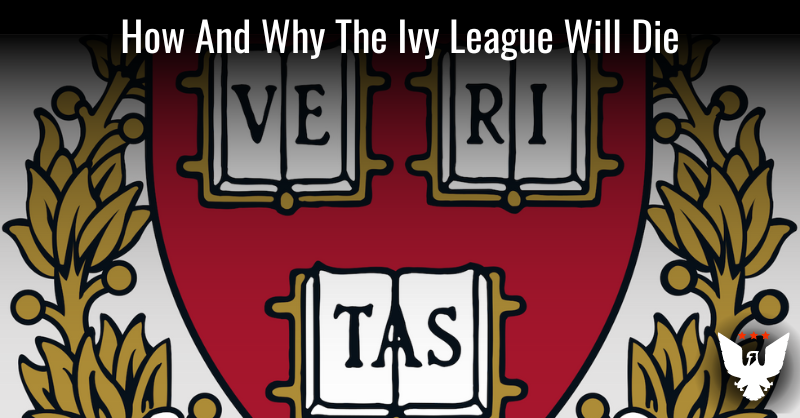How And Why The Ivy League Will Die
By: Isaac Simpson (The Federalist)



Have you ever met a college admissions officer? Who does he or she remind you of?
The answer is: "someone who works at the DMV." Put nicely, they're people who've done the best they could with limited options. Put cruelly, they're midwits on a power trip. Perhaps a tad less cynical. A little skinnier. Glasses a bit higher end. But platonically speaking, college admissions officers and DMV workers emanate toward the same form: the ultimate low busybody.
DMV workers afflict the immense class of drivers with their mediocrity. Admissions officers' victims are a smaller set — people who go (or don't go because of them) to college. An even smaller set are those who go to colleges that matter, usually measured at about 200 or 300 schools in the mass field of 4,000 predatory loan farms that offer college degrees. And even smaller still are those who go to the best of the best, the places that supposedly mint the leaders of the Western World, the Ivy League.
All higher education institutions share more or less the same middle layer: admissions officers and an army of related bureaucrats that effectively run the institution. Stanford, for instance, has 15,750 non-teaching employees — nearly double the amount of undergraduates at the school and almost seven times the number of faculty.
The responsibility for the destruction of the Ivy League lies not with wokeness nor diversity hires nor a naive donor class, but with the people who are supposed to be keeping the lights on. Middle management.
Conquest
Robert Conquest, an eminent historian and funnily enough, a longtime research fellow at Stanford University's Hoover Institution, coined three laws that go as follows:
- Everyone is reactionary about what he knows best.
- Any organization not explicitly right-wing will sooner or later become left-wing.
- The simplest way to explain the behavior of any organization is to assume it is controlled by a cabal of its enemies.
Taken as a whole, these laws depict the decomposition process of institutions. They reveal why they inevitably swim left, at least in countries like America, where "explicitly right-wing internal policy" has been all but abandoned, even in supposedly right-wing organizations.
- Institutions start as "reactionary," created by people deeply familiar with their subject matter and purpose.
- But, over time, founders leave, and the less knowledgeable take over. (Not only are they less knowledgeable, but they're probably less passionate and less dedicated to the original mission; they're just doing a job).
- These newcomers push the institution "leftward," toward a less meritocratic, more "equal" sort of organization because they are themselves of less merit.
- Unless there are specific rules inside the organization to prevent rot, the institution will drift further and further left, until it is itself a microcosm of socialism — an organization that exists not for any purpose or progress beyond maximizing the quality of life of its members.
This covers the first two Conquest Laws, but it's the third — incomprehensible at first glance — where the real magic lies. It's a modified Occam's Razor: Institutions decline along the same leftward course so reliably that, when they arrive into our perceptive field, the simplest way (the best way) to understand them is to assume they've been taken over by such parasites.
What he's saying, put simply, is that most operating non-reactionary institutions are zombies. They might look alive, going about their business making widgets, but in reality, they seek only to survive long enough to bite another institution and spread their disease.
Another way to think of this is "POSIWID," an acronym used by systems engineers that stands for "the Purpose Of a System Is What It Does." Essentially, the idea is outcomes are a more reliable way to determine what a system is about than the stated intentions of the people who created it.
An example of POSIWID is what happens with most SaaS (software as a service) companies. Founders create SaaS companies because they earnestly want to make systems cheaper and more efficient. But what happens over time? Does their product actually make anything or anyone more efficient? If you've ever worked at a major corporation, you know the answer is almost never. Many corporations that adopt expensive software systems find that over time, things aren't any more efficient than back when they used paper for everything. People work more hours in the day, and it's all more expensive than it used to be.
What most SaaS companies do is make things less efficient while costing more money. This isn't because the company has failed, it's because the company has succeeded in its true purpose, which is to serve as a blood feast for the enemies of its original founders — those who want things to be more expensive and less efficient because they don't have the ability, knowledge, or desire to do better.
Chaos
If there's ever been an institution more clearly run by a cabal of its enemies, it's America's elite universities. Harvard's original 1636 mission statement was:
Let every student be plainly instructed and earnestly pressed to consider well the end of his life and studies is to know God and Jesus Christ, which is eternal life, and therefore to lay Christ in the bottom, as the only foundation of all sound knowledge and learning.
Quite obviously, Harvard exists today to do precisely the opposite. If we take this as its true mission, then it's run by its worst enemies. But let's take a more practical view, which is that Harvard's 1836 motto "VERITAS" is the purpose of the institution. Even then, it would appear that Harvard exists mostly, if not entirely, to obfuscate the truth, rather than reveal it. This is because its enemies, who run it, can't determine the truth and resent anyone who can.
I don't mean woke diversity hires like Claudine Gay, as she (in some ways) still benefits from VERITAS, at least insofar as speaking "her truth" as a black woman is concerned. It's also not cynical elitist donors looking for ways to one-up each other at dinner parties, nor is it even wokeness itself, with all its manipulative agitprop. The true enemies of Harvard University are exactly the people Conquest warned us about — the midwit managers in charge of the institution itself: the admissions department.
DMV workers hate you. You know it. They know it. It's obvious. Similarly, the Harvard admissions department hates Harvard students. The elite students are (or were) the class enemies of the admissions officers, who are always middles, lower middles, or even proles. Thus the admissions officers did what middle managers always do to institutions over time, actively dismantling the reactionary rules that gave the institution its original form. There are no greater "explicitly right-wing" rules than extremely high admissions standards. They kept the Ivy League important for a long, long time, but inevitably the rot became too great, and the managers, the enemies of the institution of truth, found a way to destroy those standards and open the floodgates to their own class.
The result is not the mass elevation of proles to elite status, which is of course impossible, but chaos. And chaos has a certain look. It looks like this:
In a recent Atlantic article, the reader learns that members of ultra-elite Yale secret society Skull and Bones ripped down posters of old white guys and replaced them with woke apologia. Then you learn that Skull and Bones classes have been exclusively non-white since 2020. Then you learn that on a visit to Skull and Bones alumni George Bush's home, this new cohort confronted and denigrated the ex-president, accusing him of war crimes and racism.
An institution run by its enemies.
Chaos is not random. It has a look of its own. It's poop on the street. It's open-air drug markets. It's food deserts and bread lines. Chaos is not a sandwich. It's not the Chicago Bears. It's not just anything. Chaos is the shape of things when a better shape isn't forced, isn't mandated by people who care.
This is Conquest's point about institutions. If we don't enforce reactionary right-wing rules — such as "elitism" and "meritocracy" — inside them, they won't just dissolve into nothing. They will become the undead, hellbent on turning every institution into hideous monsters like themselves. It's happened in almost every experiment with communism the world over. And it's quite obviously happening here.
There's a bitter irony in the fact that Conquest became famous as a historian for exposing the mass murder and atrocities when communists took over governments. But he was also a poet of some note, and aside from his famous laws about institutional decline, it was in verse where he explicitly warned what would happen when bureaucrats came to dominate academia:
'Those teach who can't do' runs the dictum,
But for some even that's out of reach:
They can't even teach — so they've picked 'em
To teach other people to teach.
Then alas for the next generation,
For the pots fairly crackle with thorn.
Where psychology meets education
A terrible bullsh-t is born.
Calling members trolls or dishonest will cause your comments to be deleted.





I'm with Robert Conquest
Yep.
I do not think the Ivy League per se will die. I think that there is far too much emphasis on extreme political views than n education on the campuses of many universities.
We call that an understatement and that is why such institutions are now producing indoctrinated, stupefied graduates.